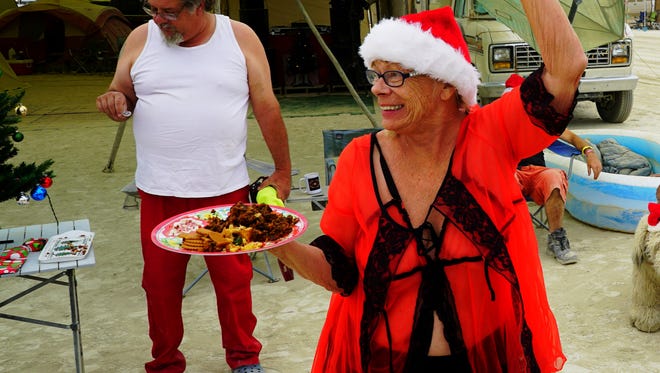Burning Man's loving engine powered by wealth, privilege

BLACK ROCK CITY, Nev. — As I fumbled for a $20 bill to buy ice, my wallet felt unexpectedly foreign.
I'd been in Burning Man's temporary city for nearly a week and it was the first time I'd had to pay for anything.
That's a big part of this whole experience: Decommodification.
In other words, you basically can't buy anything here. This isn't a barter economy, either.
Instead, the 70,000 folks here just give you things. Sweaty naked hugs? Yes (but no thanks). French toast made with challah bread flown in fresh from Berkeley? Absolutely. The best Moscow mule you've ever had? Definitely. Free airplane rides? No problem.
80-foot Man engulfed in fire at Burning Man
Burning Man operates on what's known as a gifting economy, where almost all commercial transactions are banned. (The exceptions tend to be for health reasons, like ice and RV clean outs.)
It's an ostensibly egalitarian system where people who have share with those who don't. But increasingly, Burning Man is populated by people who most definitely "have" -- particularly newly wealthy young tech workers from San Francisco.
Sure, there are a relative handful of working folks at Burning Man, but the only way this event operates in its present incarnation is with the participation of the wealthy. Most people here aren't struggling every day to put food on their tables. Instead, they're using paid vacation time to indulge their creation of an absolutely unique and temporary culture while watching artists build and then burn down elaborate structures.

"The answer is you need that mix. It's not a poor person's event, by any means," said Steven Gluckstern, 65, of Santa Fe.
I met Gluckstern on Thursday as his camp, Mystopia, gave away 4,000 pieces of French toast. Wearing a top hat and satin smoking jacket, Gluckstern said "gifting" the French toast is a form of philanthropy.
Now, the reality is that pretty much everyone here could buy their own French toast. They don't need this charity.
But.
Burning Man's massive pyrotechnics send art up in flames
There's also something absolutely refreshing about the complete lack of commercialism at Burning Man.
Tech workers from Google and Facebook and other Silicon Valley startups make up a significant percentage of attendees, but buried under those furry vests and goggles, you'd never know their day jobs are underwritten by people who sell you stuff.
People cover up or alter logos on rental vehicles, or subvert well-known logos. There's no advertising for America's best-known brands, with the sole exception being a midweek TED Talk.

All in all, it's incredibly pleasant to not have TV or radio or newspaper or Internet advertising confronting you every time you turn around.
Gone are the exhortations to buy the latest gadgets or refinance a house or lease a luxury SUV. In their place, well-meaning tech workers serve waffles and psychiatrists in banana hammocks offer real maple syrup. Signs are almost all handmade with tongue firmly in cheek.
Burners, as they're known, take pleasure in subverting modern culture, even as many of them help shape it. Katy Perry and Paris Hilton showed up but you'd never know that if you weren't checking their social media posts. (Paris Hilton might have been in disguise, but she didn't bother to hide the fact she was camping amidst luxury RVs in what's known derisively as a plug-and-play camp for the rich who don't want to quite give up all the comforts of city life.)
The point about commercialism hit home for me this week when I rode my dusty, creaking bike past a camp blasting Christmas music and handing out free fruitcake. I had to stop, obviously: Nothing screams American consumption like the Christmas shopping season.

Bearing a plate of fruitcake and Christmas cookies, Sunshine Rudiak of Arizona smiled when I asked her if the subversion of the shopping season was deliberate.
Rudiak, who was wearing a red-lace teddy and dancing in a dust storm as she yelled at passers-by, seemed pretty happy with the results.
"It's wonderful," she said with a sigh.